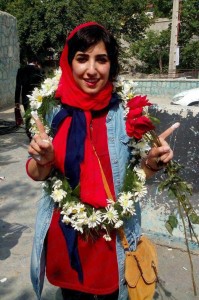As we celebrate Independence Day, we also celebrate the independent spirit of our country’s founders, men and women who fought against an oppressive regime and eventually gave us the law that CBLDF works to protect: the First Amendment.
Freedom of expression isn’t exclusive to the United States, but most countries don’t have the protections we do. Many cartoonists around the world learn this the hard way, facing prosecution and imprisonment on a regular basis. It isn’t all bad, though. Sometimes, cartoonists win.
This spring saw the release of two Iranian cartoonists who had been separately arrested for their work and held in Tehran’s Evin Prison. Hadi Heidari, who had been re-arrested on a previous charge from last November, was released on April 26. Less than a week later, Atena Farghadani was freed after her sentence of 12 years and 9 months was reduced to 18 months, which she had already served.
Some sources linked Heidari’s most recent arrest with a cartoon that he posted on Instagram, mourning the victims of the November 13 Paris attack, but it’s not clear the two were related. Iran’s rulers are not sympathetic to ISIS, and President Hassan Rouhani quickly condemned the attacks. While Iranian hardliners are “wary of any perceived expression of friendly overtures to secular Western countries, which they might have thought the cartoon conveyed,” Heidari was more likely arrested in retaliation for his domestic reform advocacy.
Heidari first came to the government’s attention in 2009, when he was involved with the Green Movement that arose after the disputed re-election of then-President Mahmoud Ahmadinejad. He was arrested for “assembly and collusion against national security” and again in 2010 for “propaganda against the state.” He was not convicted on either count.
In 2012, though, a national furor arose in response to his cartoon “The Blindfolded Men.” Heidari’s opponents say the men are soldiers in the Iran-Iraq War of the 1980s and that the cartoon implies the military was misled. Heidari denies that they represent soldiers, pointing out they’re not wearing military uniforms. Regardless, he was called into court, the manager of Shargh Newspaper, which published the cartoon, was arrested, and the newspaper itself was temporarily banned.
Heidari announced his release on Instagram:
Hello to freedom! By the grace of God, I was released from Evin Prison tonight after serving time. Thank you all for the kindness. I am extremely grateful to all my friends who supported me and my family during this time. Thank you. I hope I am worthy of your kindness.
Upon her exit from Evin Prison on May 3, Farghadani was greeted by family and supporters bearing flowers. Cartoonists Rights Network International spoke to her directly, and she “expressed her utmost appreciation for [CRNI] and all organizations, cartoonists and activists who have supported her throughout her incarceration and given a voice to her and her cause.”
Farghadani was first arrested in August 2014 for a cartoon mocking members of Parliament as they debated a bill to ban voluntary sterilization procedures. When Farghadani was released on bail, she uploaded a video to YouTube detailing abuses she suffered in prison, including beatings, strip searches, and non-stop interrogations. She was rearrested in January 2015 and sentenced after a perfunctory jury-less trial.
During her appeal, Farghadani was additionally charged with “non-adultery illegitimate relations” for shaking her lawyer Mohammad Moghimi’s hand. Contact between unrelated members of the opposite sex is technically illegal in Iran, but rarely prosecuted. Moghimi was also charged. Both were acquitted in January 2016, but Farghadani was involuntarily subjected to virginity and pregnancy tests.
Last year, Farghadani was honored with the 2015 Courage in Editorial Cartooning Award from CRNI. After her release, she told CRNI that “although she’s happy to be free, she is also concerned about all of the unknown prisoners who have no supporters.” While many other Iranian cartoonists under duress have fled the country, Farghadani said that her hope is “to stay in Iran and continue working as an artist.”
In light of the fact that she spent 18 months in prison for drawing a caricature, Farghadani could be forgiven for taking a bit of a professional break to savor her newfound freedom. Instead, she was back on Facebook in late June with a new cartoon taking aim at the state-run women’s university that expelled her after she was arrested.
While the release of the two cartoonists is certainly welcome news, it does not necessarily signal a universally improved climate for freedom of expression in Iran. Rouhani has voiced support for increased media freedoms, but he does not hold much sway over the court system. The same day Heidari was released, in fact, four journalists were convicted of spreading propaganda (specifically, “paving the way for U.S. infiltration of the country”) and sentenced to between 5 and 10 years in prison.
Independence isn’t the exclusive province of the United States, and we’re lucky to have the First Amendment on our side! Please help support CBLDF’s important First Amendment work in 2016 by visiting the Rewards Zone, making a donation, or becoming a member of CBLDF!

